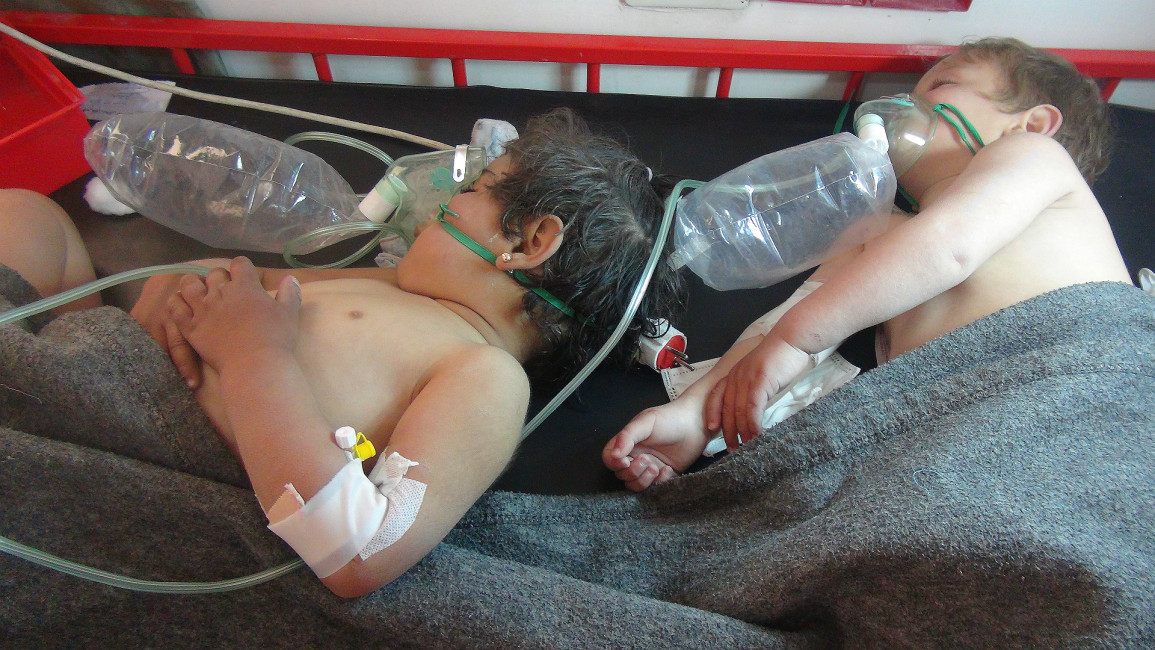Rocket hits hospital treating Syria 'gas attack' victims
A rocket slammed into a hospital in northwestern Syria on Tuesday as doctors treated victims of a suspected chemical attack, destroying part of the building.
The projectile hit the building in the rebel-held town of Khan Sheikhun in northwestern Syria, bringing down rubble on top of medics as they struggled to deal with victims of an attack that reportedly killed at least 72 people, includingat least 20 children.
The Britain-based monitoring group was unable to confirm the nature of the substance, and said it was unclear if the planes involved in the attack were Syrian or those of government ally Russia.
The Observatory said medical sources in the town reported symptoms among the affected including fainting, vomiting and foaming at the mouth.
The victims were mostly civilians, it said.
Photographs circulated by activists showed members of the volunteer White Helmets rescue group using hoses to wash down the injured, as well as at least two men with white foam around their mouths.
Idlib province is largely controlled by an alliance of rebels including former al-Qaeda affiliate Fateh al-Sham Front.
It is regularly targeted in strikes by the regime, as well as Russian warplanes, and has also been hit by the US-led coalition fighting the Islamic State group, usually targeting extremists.
Syria's government officially joined the Chemical Weapons Convention and turned over its chemical arsenal in 2013, as part of a deal to avert US military action.
But there have been repeated allegations of chemical weapons use by the government since then, with a UN-led investigation pointing the finger at the regime for at least three chlorine attacks in 2014 and 2015.
The government denies the use of chemical weapons and has in turn accused rebels of using banned weapons.
The attack comes only days after forces loyal to President Bashar al-Assad were accused of using chemical weapons in a counter-offensive in neighbouring Hama province.
The opposition accused the government forces of using "toxic substances" in its battle to repel the assault.
On Thursday, airstrikes on several areas in the north of Hama province left around 50 people suffering respiratory problems, according to the Observatory, which could not confirm the cause of the symptoms.
The monitor relies on a network of sources inside Syria for its information, says it determines whose planes carry out raids according to type, location, flight patterns and munitions used.
'Truth, reparations and justice'
The reported gas attack comes at the start of a two-day conference on Syria's future hosted in Brussels by the European Union and the United Nations to resolve the Syrian conflict and tackle the resulting humanitarian crisis.
| Read more here: EU, UN plan for Syria's future at aid conference |
Iverna McGowan, director of Amnesty International's European Institutions office, called on representatives of the EU, UN, and the numerous countries meeting in Brussels to ensure truth, reparations and justice for the victims of the conflict and their families.
"If a just and sustainable peace in Syria is to be achieved, leaders at the Brussels conference must ensure that accountability is at the centre of their discussions," she said in a press release on Tuesday.
"The victims and survivors of the mass atrocities committed in this conflict have the right to truth, reparations and justice."
McGowan added that the warring parties of the Syrian conflict were "behaving as if there are no red lines".
Tuesday's gathering in Brussels has been billed as a follow-up to a donors' conference last year in London, which raised about $11 billion (10 billion euros) for humanitarian aid programmes in the devastated country.
The Syrian conflict began when the Baath regime, in power since 1963 and led by President Bashar al-Assad, responded with military force to peaceful protests demanding democratic reforms during the Arab Spring wave of uprisings, triggering an armed rebellion fuelled by mass defections from the Syrian army.
According to independent monitors, hundreds of thousands of civilians have been killed in the war, mostly by the regime and its powerful allies, and millions have been displaced both inside and outside of Syria.
The brutal tactics pursued mainly by the regime, which have included the use of chemical weapons, sieges, mass executions and torture against civilians have led to war crimes investigations.



